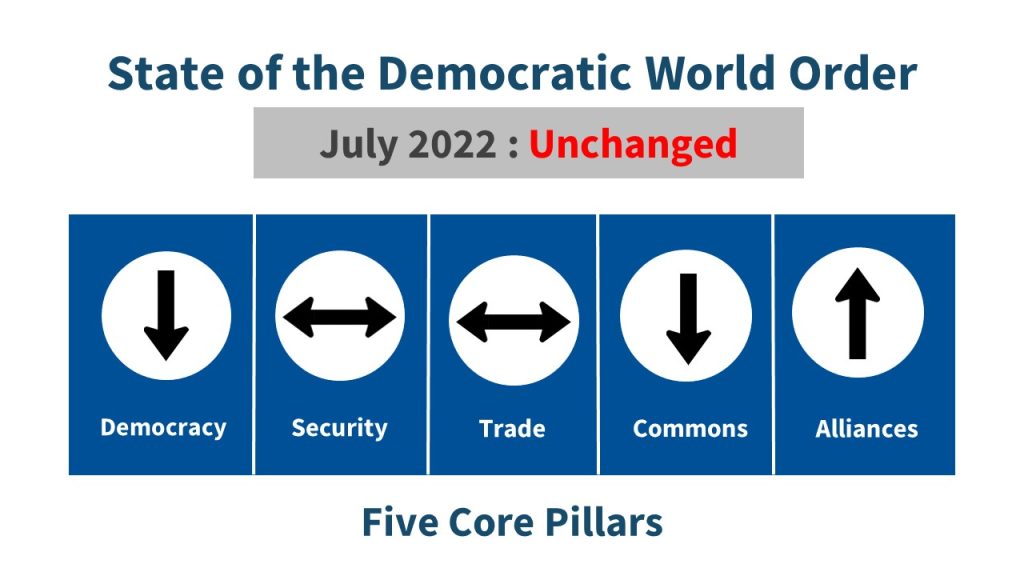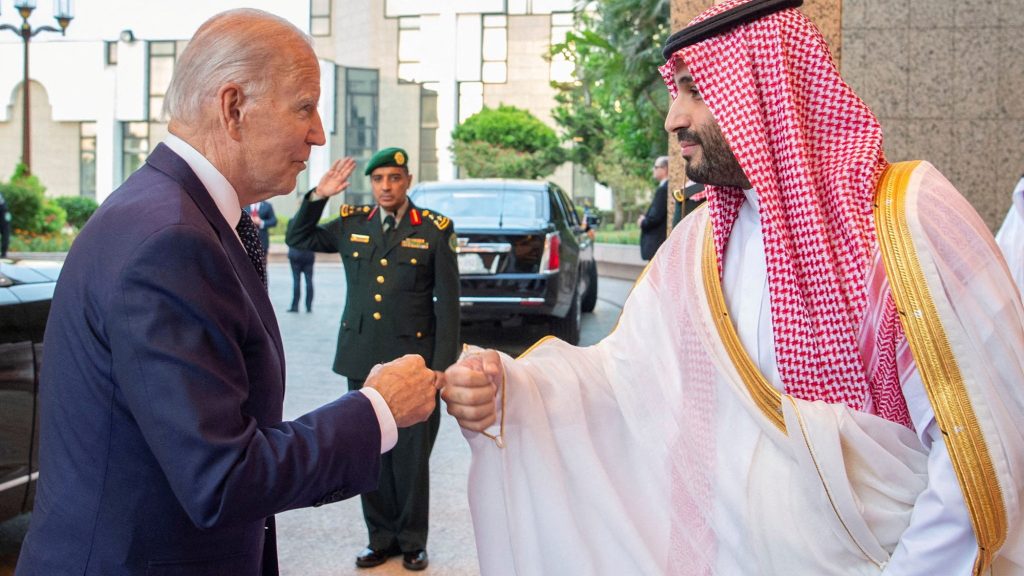Reshaping the order
This month’s topline events
Biden in Saudi Arabia. In a controversial visit to Saudi Arabia, President Joe Biden met with Saudi crown prince Mohammed bin Salman, who, according to US intelligence officials, was responsible for ordering the brutal murder and dismembering of Washington Post journalist Jamal Khashoggi. Biden later joined the leaders of other Arab states to discuss regional challenges. He also traveled to Israel, where he issued a joint statement vowing that the United States would use “all elements of its national power” to prevent Iran from obtaining a nuclear weapon.
- Shaping the order. Biden’s decision to meet with the Saudi prince, despite his earlier pledge to make Saudi Arabia a “pariah,” highlighted the dilemma facing US leaders on how to deal with autocratic allies. Washington needs to forge a broad coalition of partners to counter Iran and succeed in the long-term strategic competition with China and Russia. But the optics of a presidential visit in the wake of Riyadh’s draconian human rights practices risks undermining US soft power and efforts to promote democracy around the world.
- Hitting home. Biden’s trip could lead to an increase in oil production by Saudi Arabia and other Gulf states, bringing down gas prices in the United States.
- What to do. The Biden administration should prioritize engagement at lower levels as it seeks to enhance cooperation with Riyadh and other Arab partners on shared challenges. At the same time, it should make clear that it continues to view the advance of democratic values as a key component of a stable, rules-based international order.
China threatens Taiwan. US House Speaker Nancy Pelosi prepared to lead a congressional delegation to Taiwan, on a broader trip to the Asia-Pacific, as Chinese officials warned that they would regard the visit as “a gross interference in China’s internal affairs” and that the People’s Liberation Army would “not sit idly by.” The Pentagon reportedly expressed concerns about the visit and its potential to escalate regional security tensions. But in a phone call with Chinese President Xi Jinping, Biden defended Pelosi’s right to travel to Taiwan – which would be the second time a House speaker made such a visit – while maintaining that Washington’s “One-China policy” had not changed.
- Shaping the order. Pelosi’s decision to visit the island, in defiance of Beijing’s threats and despite the Biden administration’s cautionary advice, serves as a dramatic reaffirmation of America’s commitment to stand with Taiwan, which, like Ukraine, lies on the frontline of a broader global struggle between democracy and autocracy. The visit, coupled with Biden’s previous statements committing to defend the island, may result in bringing the US closer toward a policy of “strategic clarity” that could help deter a future Chinese attack.
- Hitting home. The United States has a strong interest in deterring a potential Chinese invasion of Taiwan, which could have far-reaching and potentially devastating military and economic impacts.
- What to do. The Biden administration should continue to defend high-level congressional visits to the island and resist Beijing’s intimidation tactics, while maintaining an open dialogue with Beijing to help ratchet down tensions.
Ukraine halts Russian advance. Buoyed by the delivery of new and more sophisticated weapons systems supplied by the US and NATO allies, Ukrainian military forces pushed back Russian advances in eastern Ukraine, which slowed almost to a standstill. The moves prevented Russia from taking control of all of the Donbas region – one of Russian president Vladimir Putin’s key goals in the ongoing war – as Ukraine began to prepare for a major new counter-offensive around Russian-controlled Kherson in the south. Separately, Washington continued to seek support for a price cap on Russian oil, holding talks with major oil importers, including India and China.
- Shaping the order. The renewed momentum by Ukrainian forces could mark a turning point in the months-long conflict, potentially forcing the Kremlin to scale back its operations and pursue a diplomatic solution to end the war on terms more favorable to Ukraine. But Russian forces may still find ways to effectively adapt their battlefield tactics, as they did following earlier setbacks around Kyiv. Ukraine’s ability to sustain its success will hinge on continued swift delivery of advanced Western weapons systems.
- Hitting home. Americans benefit from working together with friends and allies to counter aggression and coercion by autocratic rivals.
- What to do. The Biden administration should expedite the delivery of the other advanced weaponry requested by Kyiv, while moving forward on its proposal at the G7 Summit to implement a price cap on Russian oil purchases and other steps to increase pressure on Russia’s economy.
Quote of the month
“Why are we fighting…? We are fighting together to ensure that war is never again seen by any aggressor as a means of achieving aggressive goals. And perhaps for the first time in the history of mankind we are now able to show everyone in the world and for ages that democracies, united, can stop any tyranny.”
– Ukrainian President Volodymyr Zelenskyy, receiving the Winston Churchill Leadership Award on July 26, 2022

State of the Order this month: Unchanged
Assessing the five core pillars of the democratic world order
Democracy (↓)
- On a trip to Riyadh, Biden met with Saudi crown prince Mohammed bin Salman, despite his pledge to hold Saudi Arabia accountable for the execution of Washington Post journalist and dissident Jamal Khashoggi.
- Myanmar’s military government carried out its first executions in decades, hanging four democracy activists, include a former lawmaker.
- Sri Lankan President Gotabaya Rajapaksa resigned after tens of thousands of protestors stormed the residences of both the president and the prime minister in reaction to the country’s deepening economic crisis.
- Overall, the democracy pillar was weakened.
Security (↔)
- Deploying US-supplied HIMARS rocket systems, Ukrainian troops stalled Russian forces in the Donbas, marking a potential turning point in the war.
- Putin, in a visit to Tehran, gained strong support from Iran for Russia’s ongoing military campaign in Ukraine, including the provision of hundreds of armed and surveillance drones.
- Chinese officials starkly warned against a visit to Taiwan by a US congressional delegation led by Nancy Pelosi, and began preparing for military exercises near the island.
- Biden and Israeli Prime Minister Yair Lapid pledged to work together to deny Iran a nuclear weapons capability.
- On balance, the security pillar was unchanged.
Trade (↔)
- Following mediation efforts by the UN and Turkey, Russia agreed to allow the resumption of grain exports from Ukraine’s Black Sea ports. Russian Foreign Minister Sergei Lavrov touted the agreement as a gesture of goodwill on a visit to Africa, blaming the West for the spiraling global food crisis.
- The US Congress passed the CHIPS and Science Act, a bill that would subsidize semiconductor manufacturing and invest billions in science and technology innovation to help strengthen US competitiveness vis a vis China. In addition, the EU adopted the European Chips Act, allocating $46 billion to subsidize semiconductor production.
- The EU and India revived negotiations for a free trade agreement aimed at expanding greater market access and lowering tariffs.
- On balance, the trade pillar was unchanged.
Commons (↓)
- Russia stated that it would leave the International Space Station after 2024, bringing to an end an era of US-Russian collaboration in space that began in 1994 as a marker of the post-Cold War warming of relations between the two nations.
- The World Health Organization on Saturday declared the monkeypox outbreak a public health emergency, as the disease spread to more than 70 countries.
- A European heat wave – one that some experts suggested was exacerbated by climate change – broke temperature records through much of the continent, resulting in over a thousand deaths and leading to destructive wildfires.
- Overall, the commons pillar was weakened.
Alliances (↑)
- Biden and Lapid reaffirmed the longstanding strategic partnership between Israel and the United States and the enduring US commitment to Israel’s security.
- The United States and Israel discussed the formation of the Middle East Air Defense Alliance that would integrate systems to combat Iranian drone and missile attacks – an effort that reportedly would include Saudi Arabia, the UAE, and Bahrain.
- On balance, the alliance pillar was strengthened.
Strengthened (↑)________Unchanged (↔)________Weakened (↓)
What is the democratic world order? Also known as the liberal order, the rules-based order, or simply the free world, the democratic world order encompasses the rules, norms, alliances, and institutions created and supported by leading democracies over the past seven decades to foster security, democracy, prosperity, and a healthy planet.
This month’s top reads
Three must-read commentaries on the democratic order
- David Sacks, in Foreign Affairs, contends that China may decide to move rapidly against Taiwan, and the United States should make clear that it would use force in coming to the islands’ defense.
- In Foreign Affairs, Victor Cha and Christopher Johnstone outline a plan of action to strengthen relations between Japan and South Korea, two key democratic allies that the United States needs to uphold the rules-based order.
- Elisabeth Braw, in Foreign Policy, writes on the rise of “friendshoring” as companies redirect supply chains away from China and toward friends and allies.
Action and analysis by the Atlantic Council
Our experts weigh in on this month’s events
- Fred Kempe, in CNBC, argues that, while democratic unity at the G7 and NATO summits is encouraging, the free world must do more to ensure Ukraine emerges victorious against Putin’s despotism.
- David O. Shullman and Michael Schuman, in a new report, explore key challenges and opportunities that the US and its European and Asian allies face with China moving forward.
- Patrick Quirk and Daniel Twining, in the National Interest, contend that the US and its democratic allies must go on offense to counter authoritarian aggression by empowering democratic movements, countering authoritarian influence in multilateral organizations, and strengthening democratic cooperation.
- Emma Ashford and Matthew Kroenig, in Foreign Policy, debate US strategic ambiguity toward Taiwan and what Nancy Pelosi’s trip to the island means for US-China policy.
- Barry Pavel, Peter Engelke, and Jeffrey Cimmino, in the New Atlanticist, offer a series of updated scenarios for how the war in Ukraine might end.
__________________________________________________
The Democratic Order Initiative is an Atlantic Council initiative aimed at reenergizing American global leadership and strengthening cooperation among the world’s democracies in support of a rules-based democratic order. Sign on to the Council’s Declaration of Principles for Freedom, Prosperity, and Peace by clicking here.
Ash Jain – Director for Democratic Order
Dan Fried – Distinguished Fellow
Jeffrey Cimmino – Associate Director
Danielle Miller – Program Assistant
Otto Hastrup Svendsen – Georgetown Student Researcher
If you would like to be added to our email list for future publications and events, or to learn more about the Democratic Order Initiative, please email AJain@atlanticcouncil.org.
Image: Saudi Crown Prince Mohammed bin Salman fist bumps US President Joe Biden upon his arrival at Al Salman Palace, in Jeddah, Saudi Arabia on July 15, 2022. Bandar Algaloud/Courtesy of Saudi Royal Court/Handout via REUTERS.
